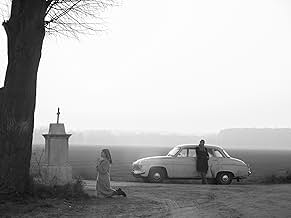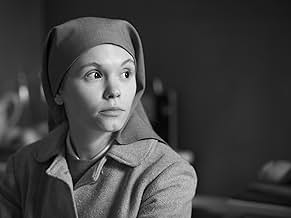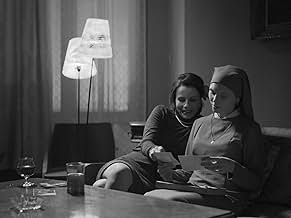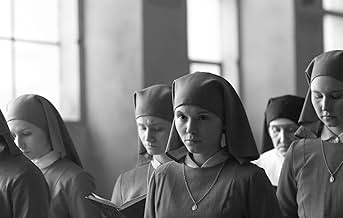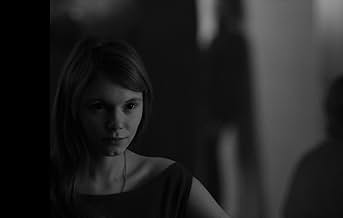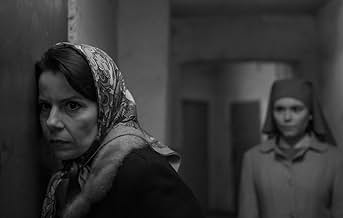CALIFICACIÓN DE IMDb
7.4/10
62 k
TU CALIFICACIÓN
Anna, una joven novicia en la Polonia de los años 60, está a punto de tomar los hábitos cuando descubre un oscuro secreto familiar que se remonta a los años de la ocupación alemana.Anna, una joven novicia en la Polonia de los años 60, está a punto de tomar los hábitos cuando descubre un oscuro secreto familiar que se remonta a los años de la ocupación alemana.Anna, una joven novicia en la Polonia de los años 60, está a punto de tomar los hábitos cuando descubre un oscuro secreto familiar que se remonta a los años de la ocupación alemana.
- Dirección
- Guionistas
- Elenco
- Ganó 1 premio Óscar
- 70 premios ganados y 92 nominaciones en total
Natalia Lange
- Bronia
- (as Natalia Lagiewczyk)
Jan Wojciech Poradowski
- Father Andrew
- (as Jan Wociech Poradowski)
- Dirección
- Guionistas
- Todo el elenco y el equipo
- Producción, taquilla y más en IMDbPro
Opiniones destacadas
This film is recommended.
Anna grew up in a Catholic orphanage, never knowing her parents. Deeply religious, she is slated to become a nun within a few weeks. However, before taking her vows, Anna must leave the convent and visit her only living relative, a cold and distant aunt. Upon their first meeting, she is told that she is really Ida, a Jewish niece. So begins their relationship and journey to find her past and specifically, her parent's unmarked graves.
With an unusually short film length of less than 90 minutes, Ida is an extremely well made film, sensitively directed by Pawel Pawlikowski. Under the backdrop of 1960's Poland, the film's premise of presenting contrasting religions and lifestyles is its main attraction. The screenplay by the director and Rebecca Lenkiewicz has much to say and tells its linear narrative concisely and without any flourish.  Ida is a fine film that could have been a great film had its script added more dimension to its central character. Anna, or Ida, is mainly a saintly conduit, a devout presence who never seems to be real in any sense. She begins as an enigma and, surprisingly, rarely displays any strong emotional reaction when confronted with disturbing news.
Agata Trzebuchowska plays Ida / Anna and she is physically right for the role. The actress invests the right degree of innocence and vulnerability. Even more effective is Agata Kulesza as Ida's bitter and alcoholic Aunt Wanda. Her role has far more depth and the actress makes subtle choices in underplaying the anger and hostility within her complex character. It is a strong and memorable performance.
The film, beautifully photographed by Ryszard Lenczewski and Lukasz Zal, might have a smaller budget than most movies these days, but one never notices any lapse in quality as production values are of the highest caliber. With lovely black & white images and a lyrical score by Kristian Eidnes Andersen, Ida is superior filmmaking, even if some of the transitions and editing seems slightly abrupt. The film effectively deals with powerful themes that will resonate with any serious film-goer and deserves to be seen. GRADE: B
Visit my blog at: www.dearmoviegoer.com
ANY COMMENTS: Please contact me at: jadepietro@rcn.com
Anna grew up in a Catholic orphanage, never knowing her parents. Deeply religious, she is slated to become a nun within a few weeks. However, before taking her vows, Anna must leave the convent and visit her only living relative, a cold and distant aunt. Upon their first meeting, she is told that she is really Ida, a Jewish niece. So begins their relationship and journey to find her past and specifically, her parent's unmarked graves.
With an unusually short film length of less than 90 minutes, Ida is an extremely well made film, sensitively directed by Pawel Pawlikowski. Under the backdrop of 1960's Poland, the film's premise of presenting contrasting religions and lifestyles is its main attraction. The screenplay by the director and Rebecca Lenkiewicz has much to say and tells its linear narrative concisely and without any flourish.  Ida is a fine film that could have been a great film had its script added more dimension to its central character. Anna, or Ida, is mainly a saintly conduit, a devout presence who never seems to be real in any sense. She begins as an enigma and, surprisingly, rarely displays any strong emotional reaction when confronted with disturbing news.
Agata Trzebuchowska plays Ida / Anna and she is physically right for the role. The actress invests the right degree of innocence and vulnerability. Even more effective is Agata Kulesza as Ida's bitter and alcoholic Aunt Wanda. Her role has far more depth and the actress makes subtle choices in underplaying the anger and hostility within her complex character. It is a strong and memorable performance.
The film, beautifully photographed by Ryszard Lenczewski and Lukasz Zal, might have a smaller budget than most movies these days, but one never notices any lapse in quality as production values are of the highest caliber. With lovely black & white images and a lyrical score by Kristian Eidnes Andersen, Ida is superior filmmaking, even if some of the transitions and editing seems slightly abrupt. The film effectively deals with powerful themes that will resonate with any serious film-goer and deserves to be seen. GRADE: B
Visit my blog at: www.dearmoviegoer.com
ANY COMMENTS: Please contact me at: jadepietro@rcn.com
simplicity, great photographs, splendid script. at first sigh, an old fashion movie. in fact, wise manner to use the legacy of impressive tradition and a great director who use, in same measure, with same precision, tension, poetry of images, atmosphere of period, cultural roots. it is a reflection occasion about origins, truth, faith and choices. a profound Polish story who reflects the identity search of an entire continent. it is , certainly, a rare gem. the cause is not only beauty of photography or admirable acting but a special flavor who remains after its end as a delicate feeling. a young woman and the courage to become here self. that is all. in skin of seductive music.
Greetings again from the darkness. Writer/director Pawel Pawlikowski films in his homeland of Poland and presents a familiar topic from a most unusual perspective. This film has been very well received on the festival circuit and it's easy to see why: it's beautifully photographed, very well acted, includes terrific music and presents an emotional story for intelligent viewers.
We first meet Anna as a novitiate nun on the verge of taking her vows. Her Mother Superior has one requirement. Anna must visit her lone surviving relative. Her Aunt Wanda is everything Anna is not: worldly, cynical, direct. In the first few minutes of their visit, Wanda (Agata Kulesza) informs Anna (Agata Trzebuchowska) that she was born Jewish with the name Ida, and she was sent to a Catholic orphanage when her parents were killed.
After this bombshell, the two set out on a journey to discover the truth and trace their roots. It's a journey of discovery not just for Ida, but also for Wanda, who carries her own burden. Questioning one's faith and one's true identity is nothing new, but this makes for quite an unusual buddy road trip. Wanda is rarely without a drink in hand and Ida has had no previous exposure to the real world.
This is the debut of Agata Trzebuchowska and her porcelain look and big eyes convey a quality with which we find ourselves comfortable with, while Ms. Kulesza evokes empathy from the viewer despite her harsh edge and beaten down outlook on life and people. Hers is a standout performance.
Two exceptional pieces of music are used to perfection: Coltraine's "Naima" and Mozart's "Jupiter" symphony. The storytelling and look of the film might be austere (stunning black and white photography) but this music hits us hard in two separate scenes.
We first meet Anna as a novitiate nun on the verge of taking her vows. Her Mother Superior has one requirement. Anna must visit her lone surviving relative. Her Aunt Wanda is everything Anna is not: worldly, cynical, direct. In the first few minutes of their visit, Wanda (Agata Kulesza) informs Anna (Agata Trzebuchowska) that she was born Jewish with the name Ida, and she was sent to a Catholic orphanage when her parents were killed.
After this bombshell, the two set out on a journey to discover the truth and trace their roots. It's a journey of discovery not just for Ida, but also for Wanda, who carries her own burden. Questioning one's faith and one's true identity is nothing new, but this makes for quite an unusual buddy road trip. Wanda is rarely without a drink in hand and Ida has had no previous exposure to the real world.
This is the debut of Agata Trzebuchowska and her porcelain look and big eyes convey a quality with which we find ourselves comfortable with, while Ms. Kulesza evokes empathy from the viewer despite her harsh edge and beaten down outlook on life and people. Hers is a standout performance.
Two exceptional pieces of music are used to perfection: Coltraine's "Naima" and Mozart's "Jupiter" symphony. The storytelling and look of the film might be austere (stunning black and white photography) but this music hits us hard in two separate scenes.
Ida is magnificent, it will stay with me a long time. The narrative is powerfully compelling and yet if it had been a non-narrative film I would have been spellbound by the images alone. They should make a coffee table book of stills from it. Huge emotional issues are dealt with in a remarkably understated, unsentimental, but appropriate way. The use of music (often my pet peeve in these days of Hollywood formula) is enlightened and illustrative. I don't think the ending is ambiguous, I'm not sure the writer who wrote that understood it. Perhaps there is something slightly facile about the way things wrap up in the last 15 minutes of the film, but this is only in comparison with how beautifully they are laid out before that. Enough, this is not really a review, it is an exhortation - Go see Ida!
Whereas Jacques Rivette's despairing 'La Religieuse' had been shot in incongruously pretty sixties Eastmancolor, this laconic but wryly good-humoured female road movie - like Ingmar Bergman's Persona' - gains much of it's seductive visual impact from being shot in coolly glacial monochrome that looks like what you'd have got if Vermeer had worked in charcoal.
Similarly, like the Scandinavian good looks of Liv Ullman and Bibi Andersson in Bergman's film, 'Ida' is fascinating to watch throughout simply for the strong Polish features of Agata Kulesza as the chain-smoking 'Red Wanda' and the button eyes of Agata Trzebuchowska in the title role.
Similarly, like the Scandinavian good looks of Liv Ullman and Bibi Andersson in Bergman's film, 'Ida' is fascinating to watch throughout simply for the strong Polish features of Agata Kulesza as the chain-smoking 'Red Wanda' and the button eyes of Agata Trzebuchowska in the title role.
¿Sabías que…?
- TriviaPawel Pawlikowski had such difficulty finding an actress to play the titular character that he asked his friends to take secret photographs if they saw anyone who was in the right ballpark of the character. One of his friends, director Malgorzata Szumowska, saw Agata Trzebuchowska in a Warsaw café, took the picture and persuaded her to audition. She agreed to meet with Pawlikowski because she was a fan of his film My Summer of Love (2004).
- ErroresWhen Ida is in a church, the priest seems to be getting ready to say Mass and we see a versus populum altar, which didn't become the norm until years later after Vatican II. The movie takes place in 1961 and the priest would have been saying Mass on the high altar.
- ConexionesFeatured in 72nd Golden Globe Awards (2015)
- Bandas sonorasSerduszko puka w rytmie cha-cha
Music by Romuald Zylinski
Lyrics by Janusz Odrowaz-Wisniewski
Performed by Maria Koterbska
Selecciones populares
Inicia sesión para calificar y agrega a la lista de videos para obtener recomendaciones personalizadas
- How long is Ida?Con tecnología de Alexa
Detalles
Taquilla
- Presupuesto
- USD 1,000,000 (estimado)
- Total en EE. UU. y Canadá
- USD 3,827,060
- Fin de semana de estreno en EE. UU. y Canadá
- USD 55,438
- 4 may 2014
- Total a nivel mundial
- USD 11,156,836
- Tiempo de ejecución
- 1h 22min(82 min)
- Color
- Mezcla de sonido
- Relación de aspecto
- 1.37 : 1
Contribuir a esta página
Sugiere una edición o agrega el contenido que falta



